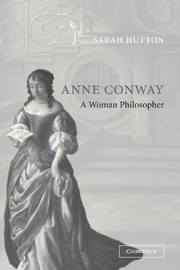Book contents
- Frontmatter
- Contents
- Acknowledgements
- Introduction
- 1 Anne Finch, Viscountess Conway
- 2 A philosophical education
- 3 Religion and Anne Conway
- 4 Anne Conway and Henry More
- 5 John Finch, Thomas Hobbes and Margaret Cavendish
- 6 Experimental physick: Boyle, Greatrakes, Stubbe
- 7 Physic and philosophy: Van Helmont, father and son
- 8 Kabbalistical dialogues
- 9 Quakerism and George Keith
- 10 Last years
- 11 Legacy
- Bibliography
- Index
2 - A philosophical education
Published online by Cambridge University Press: 22 September 2009
- Frontmatter
- Contents
- Acknowledgements
- Introduction
- 1 Anne Finch, Viscountess Conway
- 2 A philosophical education
- 3 Religion and Anne Conway
- 4 Anne Conway and Henry More
- 5 John Finch, Thomas Hobbes and Margaret Cavendish
- 6 Experimental physick: Boyle, Greatrakes, Stubbe
- 7 Physic and philosophy: Van Helmont, father and son
- 8 Kabbalistical dialogues
- 9 Quakerism and George Keith
- 10 Last years
- 11 Legacy
- Bibliography
- Index
Summary
‘Conferences concerning Des Cartes philosophy’
The question of what educational background any particular philosopher might have had is normally discussed in terms of shaping influences, be these positive or negative, that the individual concerned might have received – for example, Descartes' grounding in mathematics at the Jesuit College at La Flèche or Locke's encounter with academic scholasticism at Oxford. In the case of a woman philosopher living at a time when education for women was the exception rather than the norm, the question of educational background becomes part of the wider question of how she came to philosophy at all. This is a question which is not usually asked about male philosophers, even when the information about their education is quite full. Besides, the broad categories of school and university training do not fit the seventeenth-century female subject very comfortably. Nor are they especially illuminating in Conway's case, unless they are set in relation to other circumstances, in particular her social background, her personal relationships and the state of philosophy and philosophical education in the 1640s and 50s.
That Anne Conway was highly educated there can be no doubt. The address to the reader which prefaces her Principles describes her as ‘a woman learned beyond her sex, most skilled in the Latin and Greek literature and especially well versed in every sort of philosophy’. However, the documentation of her education is patchy, consisting largely in the imperfect record that her surviving correspondence affords.
- Type
- Chapter
- Information
- Anne ConwayA Woman Philosopher, pp. 36 - 52Publisher: Cambridge University PressPrint publication year: 2004



